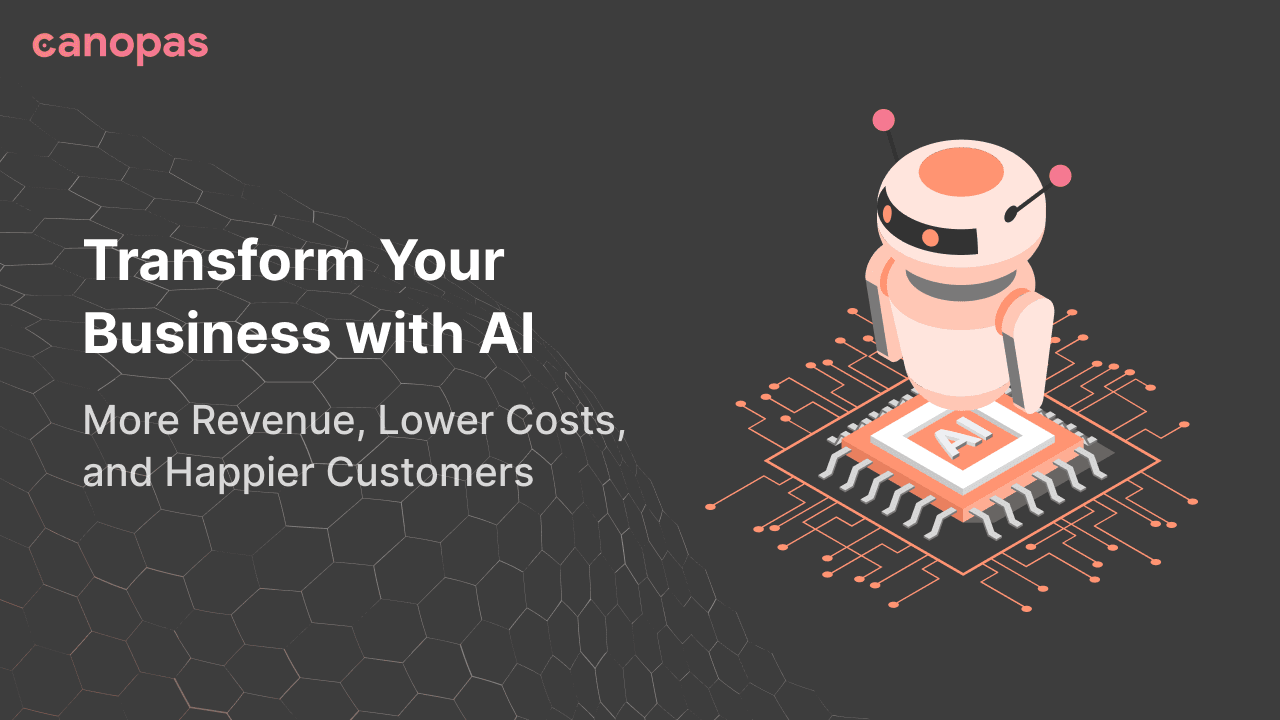
Transform Your Business with AI — More Revenue, Lower Costs, and Happier Customers
Introduction to AI and Its Business Potential
You must have heard about the most popular AI Chatbot - ChatGPT.
It offers human-like responses, understands context, and provides meaningful insights—almost as if you're talking to a well-informed colleague.
With the ability to simulate intricate human conversation, ChatGPT has garnered attention from tech enthusiasts, entrepreneurs, and curious minds alike.
But this isn't just a novelty chatbot or a fleeting tech trend. It embodies the very essence of how AI is breaking boundaries and redefining interactions.
AI, with its profound capabilities, is reshaping industries, transforming operational processes, and creating unparalleled customer experiences.
But what does this truly mean for business owners?
Can AI genuinely serve as the linchpin for increased revenue, decreased expenses, and enhanced customer satisfaction?
In this post, we will unravel the multifaceted impact of AI on business, shedding light on its potential to not just improve operations, but to revolutionize them.
Whether you're a seasoned entrepreneur or just dipping your toes into the business world, understanding the capabilities of AI can pave the way for unprecedented growth and success.
Reducing Operational Costs with AI
In the ever-evolving business landscape, tight profit margins and heightened competition demand relentless efficiency.
As companies seek innovative solutions to reduce overheads without compromising on quality, AI emerges as the trailblazing answer.
From optimizing customer service to refining inventory management, Artificial Intelligence is seamlessly integrating into operational frameworks to cut costs and elevate efficiency.
Let's delve into how AI is reengineering traditional business processes to offer a more streamlined, cost-effective approach.
The Efficiency of Automated Customer Service
The leap from ChatGPT to business-oriented AI applications is smaller than one might think.
Picture this: a 24/7 virtual customer service agent, fueled by similar technologies, ready to tackle client inquiries at any hour, without the associated overheads of human counterparts.
AI-powered chatbots and virtual assistants, inspired by models like ChatGPT, are now a reality, and they're redefining customer support.
These AI entities not only handle routine queries with confidence but also learn from each interaction, continually refining their responses.
The result?
Fewer errors, reduced wait times, and a drastic reduction in customer support costs.
Predictive Maintenance: A Proactive Approach
It's not just the customer-facing roles where AI shines. Behind the scenes, predictive maintenance tools are saving businesses thousands, if not millions, by anticipating equipment failures before they happen.
In sectors like manufacturing or logistics, unexpected downtime can lead to staggering expenses. With AI's ability to analyze vast datasets and pinpoint wear and tear patterns, businesses can now act proactively, preventing costly breakdowns.
Streamlining HR and Recruitment Processes
Hiring is an essential but often expensive endeavor. AI, however, is streamlining this process. With the capability to auto-screen thousands of resumes, schedule interviews, and even predict candidate success, businesses are finding they can reduce HR-related expenses while still attracting top talent.
Inventory Management: The Balance Act
In the retail world, inventory is a delicate balance. Overstocking leads to increased holding costs, while understocking results in lost sales.
Enter AI-driven inventory management systems.
By analyzing past sales data, current market trends, and even external factors like holidays or local events, these systems provide business owners with accurate stocking recommendations.
The days of guesswork are gone, replaced by precise, cost-effective inventory decisions.
Increasing Revenue through AI-Driven Strategies
In the grand tableau of business, reducing costs is just one half of the equation.
The ultimate goal for any enterprise is growth, and AI is fast becoming the linchpin in unlocking new revenue streams.
Through intelligent data analytics, personalized marketing, and predictive forecasting, AI is not just complementing business efforts but actively driving revenue growth.
Let's delve into the myriad ways in which Artificial Intelligence is proving to be a boon for businesses aiming to increase their bottom line.
Personalized Marketing: Crafting Tailored Experiences
In the age of information, generic marketing strategies often fall on deaf ears.
AI steps in to bridge this gap, offering tools that analyze customer behaviors, preferences, and past interactions to craft hyper-personalized marketing campaigns.
When customers feel understood and valued, they're more likely to engage, leading to higher conversion rates and increased sales.
We recently helped one of our clients - Justly implement a personalized habit suggestion bot using AI.
Sales Forecasting: Navigating the Future
Sales projections have traditionally been a blend of past data and intuition.
With AI-driven predictive models, businesses can now anticipate future sales trends with unparalleled accuracy.
This not only aids in proactive decision-making but also ensures optimal resource allocation, maximizing potential revenue.
Dynamic Pricing: Striking the Perfect Balance
Price is a pivotal factor in consumer decision-making. AI-enabled dynamic pricing tools can adjust prices in real time based on factors like demand, competition, and even external events.
Whether it's airline tickets, e-commerce products, or hotel bookings, dynamic pricing ensures businesses always hit the sweet spot, maximizing profits without deterring potential customers.
Upselling and Cross-Selling: The AI Advantage
Machine learning models can analyze purchase histories, online behaviors, and even social media interactions to predict what a customer might want or need next.
These insights empower businesses to strategically upsell or cross-sell relevant products or services, capitalizing on existing customer relationships and boosting revenue in the process.
Enhancing Customer Satisfaction using AI
Beyond the financial metrics of cost and revenue, lies a cornerstone of successful businesses: customer satisfaction.
In today’s digital age, businesses must not only meet but exceed customer expectations to foster loyalty and positive word-of-mouth.
Here, Artificial Intelligence shines brightly, offering tools and insights that cater to individualized customer needs and preferences.
Let’s explore how AI is setting new benchmarks in ensuring customers are not just satisfied, but delighted.
24/7 Customer Support: The Unwavering Virtual Assistant
In an always-on world, customers expect support that aligns with their schedules.
AI-powered chatbots and virtual assistants provide round-the-clock assistance, answering queries, resolving issues, and offering guidance, irrespective of time zones or holidays.
This consistent availability not only addresses customer needs promptly but also builds trust and reliability.
Recommendation Engines: Personalizing the Shopping Experience
We've all marveled at how certain platforms seem to "know" what we'd like next.
AI-driven recommendation engines analyze user behavior, past purchases, and browsing patterns to suggest products or services that align with individual tastes.
This tailored approach not only enhances the shopping experience but also encourages repeat purchases, solidifying customer loyalty.
Real-Time Feedback Analysis: Listening to the Voice of the Customer
Feedback is gold, and AI tools are the modern-day alchemists.
With the capability to sift through thousands of reviews, comments, and surveys in real time, AI-driven analytics platforms provide businesses with actionable insights.
By swiftly addressing concerns and continually refining offerings based on feedback, businesses can demonstrate their commitment to customer satisfaction.
Voice Assistants: Bridging the Human-Tech Divide
Conversational AI, exemplified by entities like ChatGPT, has paved the way for voice assistants in various business applications.
From voice-activated search queries to hands-free commands in smart devices, these assistants offer intuitive, human-like interactions.
By catering to the natural human preference for voice, AI ensures a smoother and more engaging user experience.
Real-world Case Studies
To truly grasp the magnitude of AI’s impact on the business landscape, it's invaluable to dive into real-life success stories.
These case studies not only highlight the multifaceted applications of AI but also offer a glimpse into the tangible benefits businesses can reap by integrating Artificial Intelligence into their operations.
1. Starbucks: Personalization at Scale with AI
Starbucks, the global coffeehouse chain, leveraged AI to elevate its customer experience.
Using its AI-driven tool, Deep Brew, Starbucks provides personalized menu recommendations to customers based on factors like order history, weather, and time of day.
The result?
Enhanced customer engagement and a notable uptick in sales.
2. Sephora: Revolutionizing Retail with AR and AI
Beauty retail giant Sephora embraced AI and Augmented Reality (AR) to enhance its in-store and online shopping experiences.
Their "Virtual Artist" feature allows customers to try makeup virtually, using AI to suggest products based on skin tone and preferences.
This innovative approach not only drove sales but also cemented Sephora's reputation as a forward-thinking retailer.
3. American Express: Battling Fraud with Machine Learning
Credit card fraud is a perennial concern for financial institutions. American Express turned to machine learning to tackle this challenge.
By analyzing millions of transactions in real time, their AI system identifies suspicious activities with unparalleled accuracy, safeguarding both the company and its customers from potential financial losses.
4. Netflix: Curating Content with AI Insights
Netflix, the streaming behemoth, employs AI to perfect its content recommendations.
By analyzing viewing patterns, search habits, and even pause and rewind behaviors, Netflix’s algorithm offers tailored content suggestions, ensuring viewers always find something they love.
This AI-driven personalization is a crucial factor in Netflix's high user engagement and retention rates.
Addressing Concerns of AI Implementation
While the advantages of AI in business are evident and plentiful, its swift rise to prominence has also sparked a series of concerns.
From ethical considerations to fears of job displacement, it's essential to address these apprehensions head-on, offering clarity and charting a responsible path forward.
1. Job Displacement: Automation vs. Augmentation
One of the most prevalent concerns is that AI and automation will lead to significant job losses.
While certain roles might undergo transformation, it's pivotal to understand that AI is more about augmenting human capabilities rather than replacing them.
As history has shown with other technological revolutions, new roles emerge as old ones evolve.
Training and upskilling employees to work alongside AI can ensure a harmonious blend of human and machine capabilities.
2. Data Privacy: Safeguarding User Information
With AI's reliance on vast datasets, concerns about data privacy are legitimate.
Businesses must prioritize transparent data collection practices, robust encryption methods, and strict adherence to privacy regulations like GDPR.
Educating customers about how their data is used and ensuring its security can alleviate many of these concerns.
3. Ethical Considerations: The Morality of Machine Decisions
As AI systems become more autonomous, questions arise about their decision-making processes, especially in morally ambiguous situations.
It's crucial for businesses to implement AI ethics guidelines, ensuring that machine decisions align with human values and societal norms.
4. Dependence on Technology: Retaining the Human Touch
While AI can handle vast amounts of data and automate various processes, there's a risk of becoming overly dependent on technology.
Businesses must strike a balance, ensuring that the human touch remains central to operations, especially in areas where empathy, creativity, and interpersonal relationships are paramount.
5. Implementation Costs: Ensuring ROI
For many small and medium-sized businesses, the upfront costs of implementing AI solutions can be daunting.
It's essential to approach AI adoption as a long-term investment. By starting with pilot projects and gradually expanding AI operations based on tangible returns, businesses can ensure a positive ROI.
Getting Started with AI
Having navigated the possibilities and addressed potential concerns, the pressing question remains: "How do we begin our AI journey?"
Embarking on the AI pathway doesn't require a radical overhaul of existing systems but rather a strategic and phased approach.
Here's a roadmap to help businesses take their first steps with confidence.
1. Identify Key Areas of Application:
Before diving headfirst, businesses must assess where AI can have the most significant impact.
Is it customer service that needs enhancement?
Or perhaps inventory management?
Pinpointing key areas allows for targeted investments and measurable outcomes.
2. Data Collection and Management:
AI thrives on data. Gathering relevant data and ensuring it’s clean, organized, and accessible is paramount.
Investing in good data management practices will provide the foundation upon which AI systems can be built and trained.
3. Collaborate with Experts:
Unless you're a tech giant with vast resources, it's often more practical to collaborate with AI service providers or consultants like Canopas.
These experts can provide insights tailored to your business needs, ensuring effective and efficient AI implementation.
4. Employee Training and Upskilling:
For AI to be seamlessly integrated, employees must be comfortable working alongside these systems.
Offering training sessions, workshops, and continuous learning opportunities can help in bridging knowledge gaps and fostering an AI-ready workforce.
5. Implement and Iterate:
Start with a pilot project. Once implemented, monitor performance, gather feedback, and iterate.
AI is a continuously evolving field, and adapting based on real-world results will ensure sustained success.
6. Ethical Guidelines and Best Practices:
Drawing from the concerns section, ensure that your business establishes ethical guidelines for AI usage.
Adhering to best practices, especially concerning data privacy and ethical decision-making, builds trust among stakeholders and customers.
7. Stay Updated:
The AI landscape is dynamic. By staying updated with the latest advancements, tools, and best practices, businesses can ensure they remain at the forefront, leveraging AI's full potential.
Conclusion: Embracing the AI-Augmented Future Together
The transformative power of AI for businesses is undeniable.
From refining operations to creating unparalleled customer experiences, AI's capabilities are reshaping the way businesses think, act, and deliver value.
Yet, with the vast potential of AI also come challenges that require discernment and strategic planning.
Addressing concerns, ensuring ethical deployment, and preparing the workforce for an AI-driven future are imperatives that businesses must navigate.
For those just embarking on their AI journey or seeking to amplify their existing AI initiatives, the path is filled with immense promise. And this is where our expertise shines brightest.
Canopas stands ready to be your trusted partner in navigating the AI landscape. With our deep domain knowledge, technical prowess, and commitment to ethical AI solutions, we are here to ensure that your business not only adapts but thrives in this new era.
Are you ready to unlock the full potential of AI for your business?
Connect with us today to embark on a journey of innovation, efficiency, and growth.









Whether you need...
- *High-performing mobile apps
- *Bulletproof cloud solutions
- *Custom solutions for your business.
